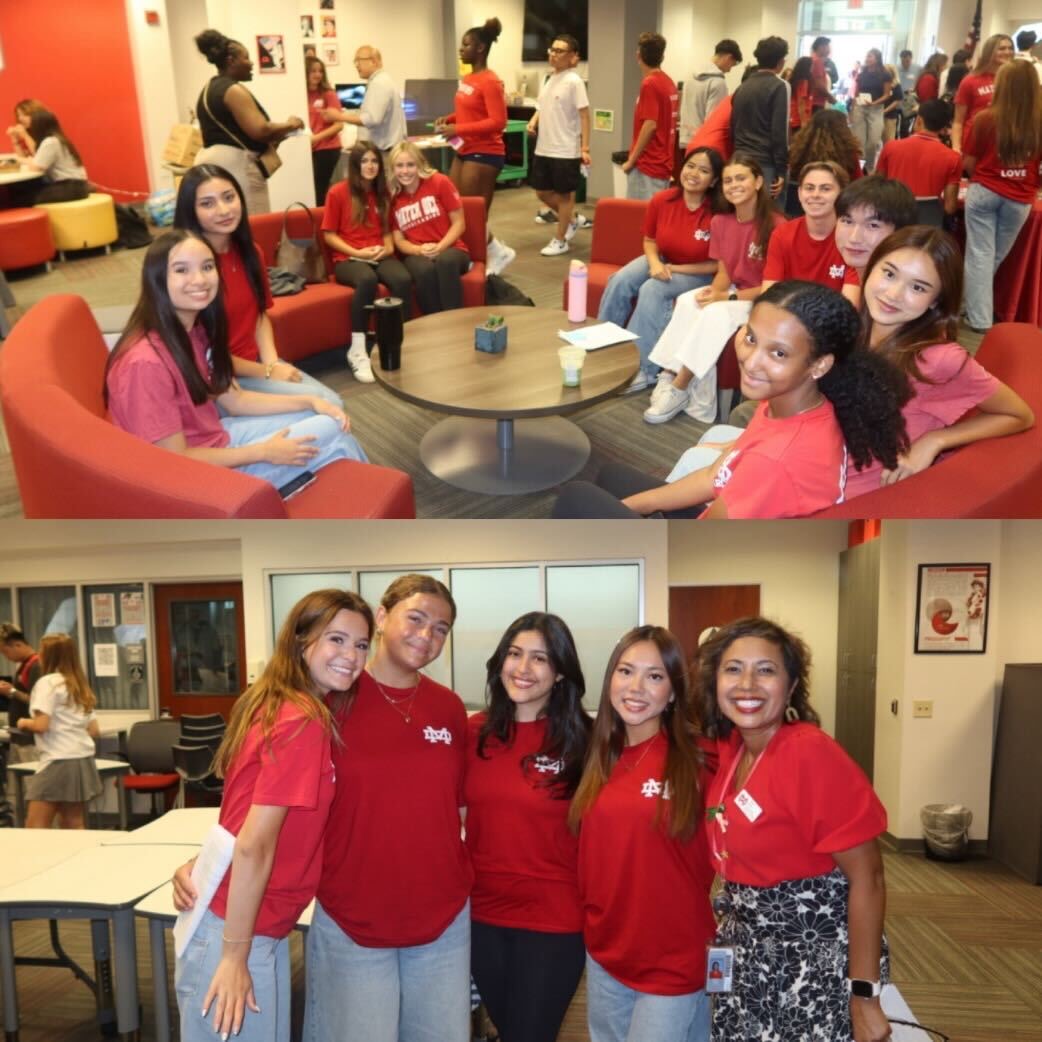Balancing school and extracurricular activities is definitely a challenge for today’s student, especially when it comes to Advanced Placement (AP) and Honors (Hn) classes. These courses are rigorous and packed with a heavy workload. On top of this, most students have commitments to things outside of academics, such as sports, clubs, and hobbies. Juggling all of this can be very stressful as a high school student. So, the question is: how do these teenagers manage it all?
Junior Natalie Thomas is a part of ASB, the Mater Dei Cheer Team, and in multiple AP classes. This can be difficult to manage given the extensive commitments ASB and cheer require. But now that she is in her third year of Honors/AP classes, she has gained the wisdom to understand the technique of completing her work on time. Thomas shares some tips for mastering the skill.
“Do not procrastinate,” Thomas said. “Because if you get everything done, any free time you have in class, get it done the second you get home [and] getting that done before you do anything else [or] before you eat dinner.”
Another thing that will help with handling academics and other activities is time management. Time management allows time for studying and homework, while also enabling more time for clubs and hobbies. Thomas speaks of this and its importance.
“It’s all time management,” Thomas said. “If you utilize your time wisely, then you’re going to be able to have time to study and all that. You aren’t going to be as stressed out. And it also helps you calm your anxiety if you already feel prepared.”
Since the AP exams are held in May each year, the initial prep from now on is critical to prevent students from cramming at the last minute. Taking Honors/AP classes and exams is a way for college admissions officers to gauge a student’s dedication to challenging coursework; high school students can take up to multiple AP classes simultaneously to impress them.
For that reason, adding AP/Hn classes, extracurricular activities, and leadership roles only increases the challenge. Senior year can feel like a marathon and a sprint to colleges at once. Additionally, some students commit earlier, others might apply to 6 -12 colleges or even more depending on their interests and intended majors. As a result, stress and anxiety within this routine are now inevitable, with late nights filled in with homework, essays, and application tasks.
Thus, not only seniors, but others sometimes feel utterly overwhelmed and burned out throughout the entire exam season, and even worse if they wait to study and cram in a few days. Math Teacher Engine Hung acknowledges the pressure students are under and has a practical strategy that would help avoid being swamped.
“There’s really no shortcut to learning things,” Hung said. “If you keep up with the material, give it enough time, and make sure to do the schoolwork well, you’ll be in pretty good shape for the AP exam.”
The exact way to handle academic burden from the very beginning is to manage academic workload effectively by breaking down big tasks into smaller daily goals. One popular method of time chunking, [Pomodoro Technique], which structures study sessions into 30-60 minute blocks followed by short breaks. This method helps students avoid burnout, stay focused and improve productivity. By pacing their work over time, students can build stronger time-management habits and reduce stress while moving steadily toward their academic goals. [Always, small steps everyday really do add up!]
An academic ideology still persists that earning a 4.0 GPA or straight A’s will determine a student’s future. The pressure of grades can exhaust students and give teens insecurities about the ability of achieving them. However, life doesn’t always follow that particular path, and it’s common for students to fall behind and continue heading toward their goals.
“There’s a random moment feeling you’re not good at doing enough, not good enough, and that your grade will never be enough,” Hung said. “One of the most important parts of life is learning to be content with doing your best – not that you stop striving for a five on the AP exam or an A in the class, but that you find balance and understand you can’t ask more of yourself than your best.”
Sometimes getting a B (or even a C) does not derail an individual from dreams and never defines who they are or what they will become. It is simply a number that shows a standing, meant to motivate rather than instill fear or a sense of failure.
Prolonged suffering from any stress or ongoing worries can sometimes result in a depressive disorder [known as dysthymia], which may involve symptoms including loss of interest in activities and getting low self-esteem.
Mrs. Kellie Bauer, the executive director of wellness counseling at Mater Dei, encourages students to seek support through her Wellness Counseling Services. She and her dedicated team are committed to providing a safe, confidential, and compassionate environment for students to genuinely share and express their experiences toward emotional healing and balance. Besides, students are welcome to reach out to either their teachers or counselor for further guidance and emotional support.
The Mater Dei community deeply values each student’s well-being, which we believe is an essential root leading to academic and personal success.
In fact, college admissions committees do not evaluate students based solely on academic performance. They also consider extracurricular activities, personal essays, and other aspects that reflect a student’s values and goals that fit in the college communities. Instead of focusing entirely on grades, participating in extracurricular activities allows students to find their inspiration, relieve stress, and contribute to their communities. Each student should work to develop their own core value through their unique strengths and experiences.






![WORK TO SUCCEED By working these tips into their study schedule, students can reap the benefits of AP courses. With just a few easy lifestyle changes, and new methods before the test, students can see an increase in scores that other successful students have witnessed. “It‘s really about making sure that throughout the year you know what you're doing,” senior Angela Karanja said. “[Also] being calm the day of, so that you can remember everything that you learned [is helpful].” Infographic by Ava Gomez.](https://thescarletscroll.com/wp-content/uploads/2025/03/IMG_5210-1200x676.jpeg)
![A YEAR IN REVIEW
Between Nov. and Dec. 2024, 57 respondents voted for their favorite songs, artists, and albums. Every category had multiple options, and each one faced tight competition as the artists Sabrina Carpenter, Kendrick Lamar, and Billie Eilish battled for the top spots. Students like senior Payton Bauer encourages others to check out other popular singers, if they haven’t already. “I would say [listen to Carpenter] if you're [wanting to] feel good about yourself,” Bauer said. “Or maybe you just want something to work out or dance to. [Her music is] really fun.”](https://thescarletscroll.com/wp-content/uploads/2025/02/Orange-Black-Why-Vinyl-Records-Rock-Music-Infographic-e1738774839991.png)


![GETTING BETTER TOGETHER Mater Dei swimmers exert themselves at morning practice. As the season approaches, the swim team must discipline themselves for their early swim competitions. “Waking up early for practice is really hard, and getting yourself up in the morning and committing to the sport can be [difficult] at times,” Acevedo said.](https://thescarletscroll.com/wp-content/uploads/2025/10/img_9894-1200x800.jpg)
![FRIENDSHIP IN PRINT Members of the Hi-Lighter student newspaper gather for a press conference in 1954. Among them is senior Lenore Rigney (O’Hara), who had worked on the publication for two years after transferring to Mater Dei as a junior. “I found the students were all so friendly and accepting,” O’Hara said. “It was [important] to be friendly to someone new and to help them get used to the school and make friends.”](https://thescarletscroll.com/wp-content/uploads/2025/10/IMG_3582-1200x794.jpeg)




![PUTTING IN OVERTIME: Student wrestlers participate in scrimmage matches during practice. The Mater Dei Wrestling Team puts a lot of time and effort into training for matches. “I practice every day,” Gomez said. “We train for three hours and then [a] two hour lift.”](https://thescarletscroll.com/wp-content/uploads/2025/09/wrestling.jpg)
![SETTING THE STANDARD: Mater Dei High School and Playfly Sports announced its historic media partnership in the spring of 2025. As Mater Dei Athletics continues to achieve new heights, Playfly will introduce new partnerships and sponsors for these programs. With the added revenue and resources, Mater Dei can improve the high school experience for all students, while engaging the community in a showcase of Monarch pride. “[This partnership is designed] to increase the experience that our athletes and our non-student athletes have with the [athletic] programs,” Melvin said. “School spirit, engagement, and pride are all things we [keep in mind].” Photo taken by Kenzington Ragge.](https://thescarletscroll.com/wp-content/uploads/2025/09/IMG_0237.jpeg)
![FAITH THROUGH GENERATIONS Lenore O’Hara ‘54 (right) and Director of Discipline and Attendance Timothy O’Hara ‘78 (left) open the 75th Anniversary Mass in the Grotto. The attendance of alumni, faculty, students, and parents highlighted the connection within the school community. Vice President of School Relations Scott Melvin reflected that this was one of his most memorable moments he has had so far. “At the beginning in our opening Mass, watching Lenore O'Hara go up on stage, speak, and open our Mass, that was really beautiful,” Melvin said. “Although [Mater Dei has] changed tremendously over the years, elements that happened back in 1950 are still present today. And we are still fulfilling the mission of Catholic education and building servant leaders with our students.” Photo courtesy of Mater Dei High School.](https://thescarletscroll.com/wp-content/uploads/2025/09/IMG_3323-1200x808.jpeg)

![DUNK THE TRASHKETBALL Honors Biology Teacher Kelly Petro clarifies the rules of his interactive science activity. Trashketball, Petro’s newly created game, reinstates crucial science concepts and terminology while allowing students to study recently learned material. Whether in the classroom or on the lacrosse field, Petro ensures that his student-athletes absorb the information using unique study methods. “For school, I try [to have] a general sense of what works for everyone in the classroom [studying wise]. I want everyone to know the [importance of what we are doing in biology],” Petro said.](https://thescarletscroll.com/wp-content/uploads/2025/06/HEIF-Image-1200x800.jpeg)
